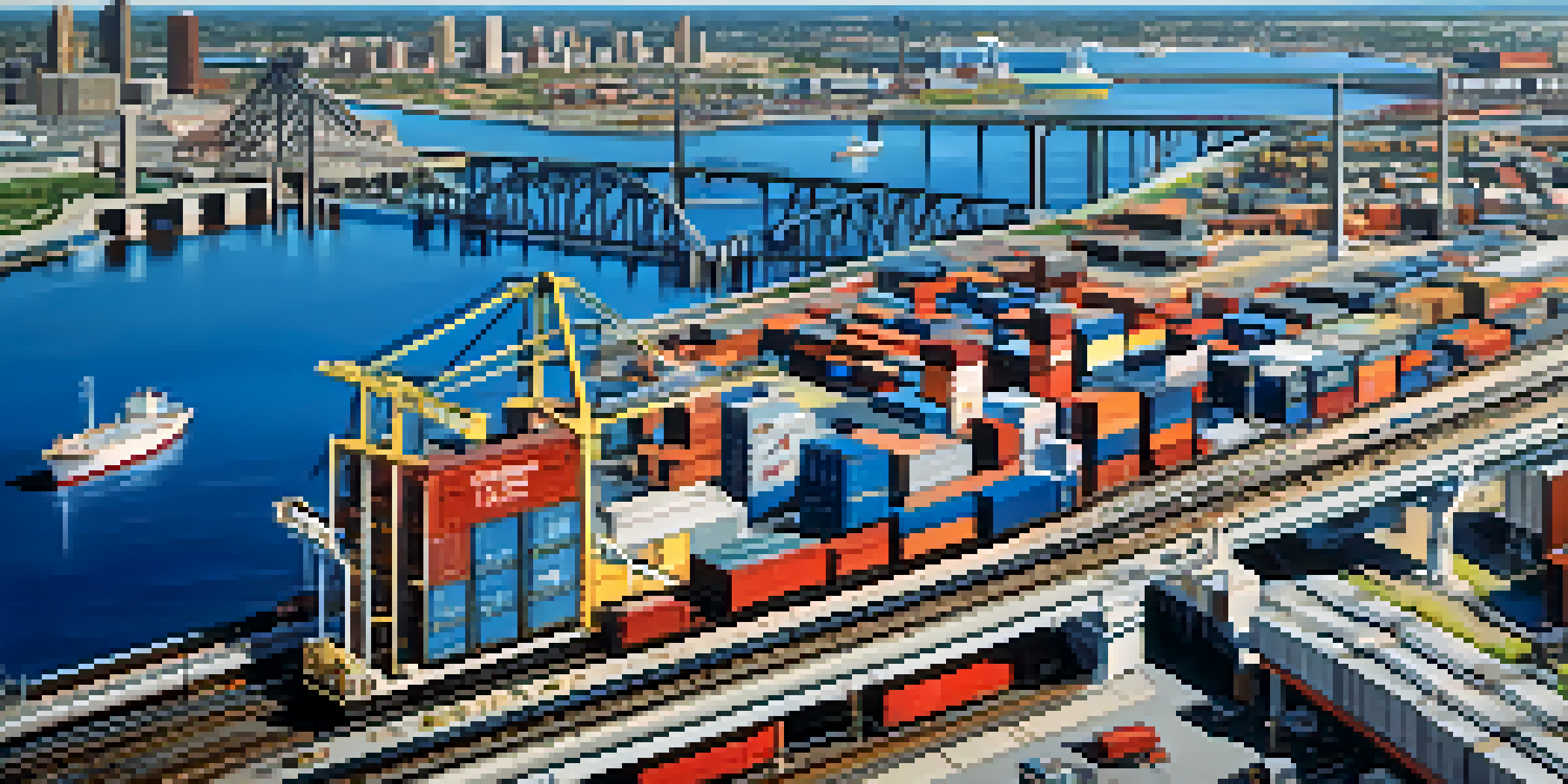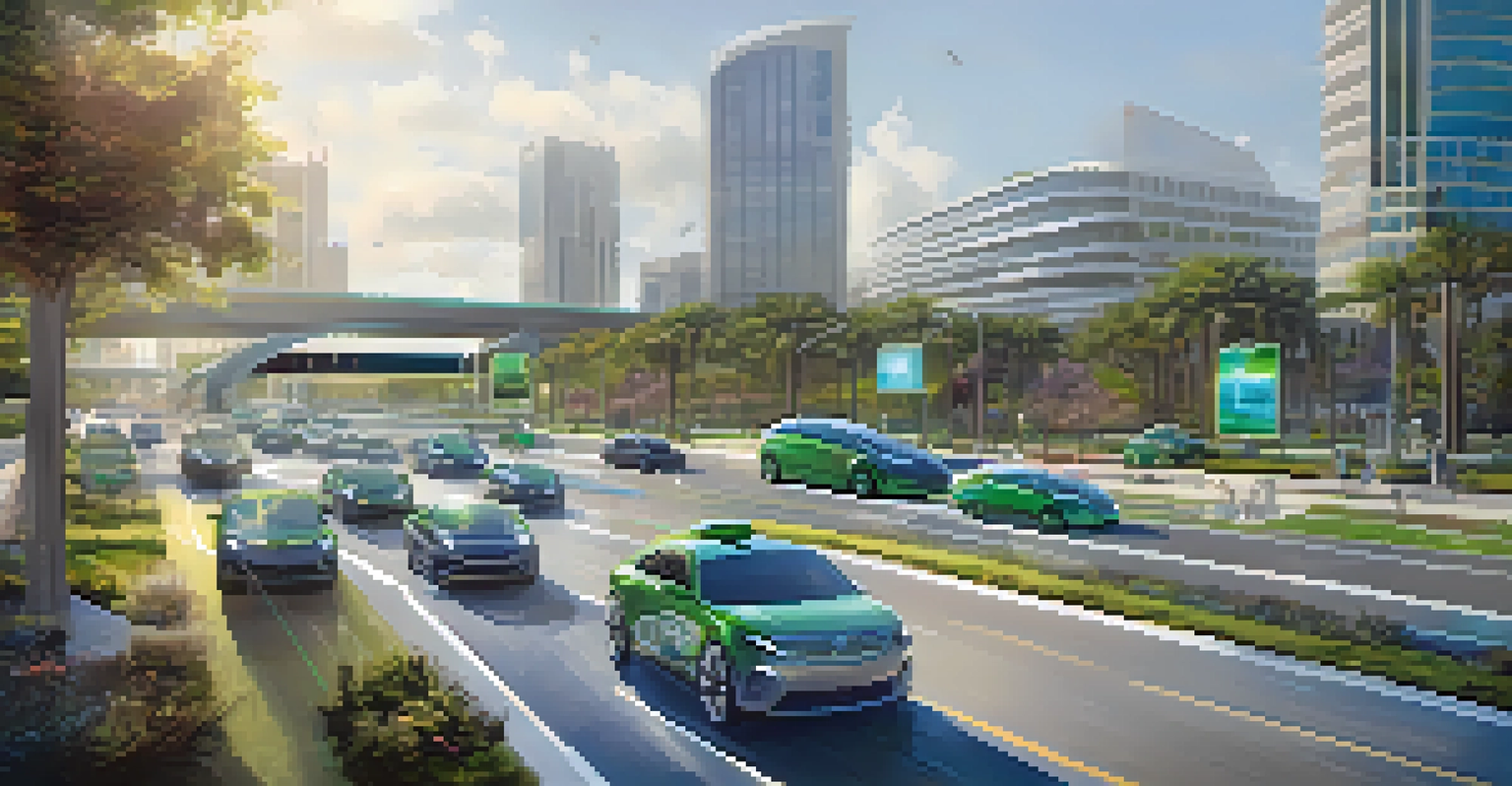Impact of Transportation on Jacksonville's Economic Growth

Overview of Jacksonville's Transportation Network
Jacksonville boasts a diverse transportation network that includes roads, railways, and waterways. This variety allows for seamless movement of goods and people, which is crucial for a growing economy. With its strategic location in Northeast Florida, Jacksonville serves as a major hub for trade and logistics, connecting the Southeast United States to global markets.
Transportation is the backbone of trade and commerce in any city.
The city’s extensive highway system, including the I-95 and I-10, facilitates efficient travel and shipping. Additionally, the Jacksonville Port Authority plays a vital role in promoting maritime trade, making the port one of the busiest in the nation. This connectivity not only enhances local businesses but also attracts new investments, further stimulating economic growth.
Moreover, the ongoing upgrades and expansions to the transportation infrastructure indicate a commitment to supporting future growth. As more businesses recognize the advantages of operating in Jacksonville, the demand for reliable transportation options continues to rise.
Impact of Transportation on Local Employment
A robust transportation system directly influences employment opportunities in Jacksonville. As businesses expand or relocate to the area, they rely on efficient transportation to move their products and services. This creates job opportunities not only in transportation but also in various sectors like logistics, retail, and manufacturing.

For example, the growth of e-commerce has led to increased demand for warehousing and distribution centers, which are typically located near major transportation routes. This trend has resulted in thousands of new jobs, contributing to a lower unemployment rate in the region. As the job market flourishes, more residents are likely to move to Jacksonville, further boosting the economy.
Transportation Fuels Economic Growth
Jacksonville's diverse transportation network enhances trade and logistics, attracting businesses and creating jobs.
Additionally, improved public transportation options help residents access job opportunities more easily. When people can commute efficiently, they are more likely to find jobs that match their skills and interests, which is beneficial for both the workforce and the local economy.
Transportation's Influence on Real Estate Development
Transportation infrastructure significantly impacts real estate development in Jacksonville. Areas with easy access to highways, public transport, or the port often see higher property values and increased interest from developers. This trend is particularly evident in neighborhoods that have improved their transportation links over recent years.
The way we move defines the way we live.
For instance, the revitalization of downtown Jacksonville has been closely tied to enhancements in transportation options, attracting new businesses and residents alike. As more people move into these areas, the demand for housing and commercial space rises, further driving economic growth.
Furthermore, the planning of new transportation projects often includes considerations for future real estate developments. This proactive approach ensures that transportation and urban growth go hand in hand, creating vibrant communities that support both residents and businesses.
The Role of Transportation in Trade and Commerce
Transportation is the backbone of trade and commerce in Jacksonville, enabling the city to thrive as a logistics hub. The Jacksonville Port is a key player in this ecosystem, facilitating the import and export of goods and contributing significantly to the local economy. This port is particularly vital for industries such as automotive, electronics, and agricultural products.
Moreover, the interconnectedness of road and rail networks allows for efficient distribution of goods throughout the region and beyond. This level of connectivity not only benefits local businesses but also attracts companies looking for a strategic location to establish their operations.
Public Transit Boosts Job Access
Improvements in public transportation provide residents with better access to employment opportunities, supporting local economic development.
As trade continues to expand, the need for reliable transportation solutions becomes even more critical. Jacksonville's ability to adapt and grow its transportation infrastructure will be essential in maintaining its competitive edge in the marketplace.
Public Transportation Improvements and Economic Access
Public transportation is crucial for ensuring economic access for all Jacksonville residents. Improved bus and transit services enable individuals without personal vehicles to travel to work, school, or essential services. By expanding public transport options, the city helps reduce barriers to employment and enhances overall quality of life.
For instance, initiatives to increase the frequency and coverage of bus routes have made it easier for residents to reach job centers and educational institutions. This not only supports workers in finding employment but also helps businesses by providing a larger pool of potential employees.
Furthermore, investing in public transportation can lead to broader economic benefits. When people can commute easily, they are more likely to spend money in their communities, supporting local businesses and contributing to a thriving economy.
Environmental Considerations in Transportation Planning
As Jacksonville continues to grow, environmental considerations in transportation planning are becoming increasingly important. Sustainable transportation options, such as bike lanes and electric bus services, are being integrated into the city’s infrastructure projects. This focus on sustainability not only helps reduce carbon emissions but also enhances the quality of life for residents.
Efforts to promote public transit and non-motorized transportation methods encourage a shift away from reliance on cars, easing traffic congestion and minimizing pollution. The long-term benefits include healthier communities and a more attractive city for potential residents and businesses.
Sustainability Shapes Future Plans
Environmental considerations in transportation planning promote sustainable options that benefit both the community and the economy.
Moreover, by prioritizing environmentally friendly transportation options, Jacksonville can position itself as a leader in sustainable urban development. This approach not only meets current needs but also ensures that future generations can thrive in a healthy environment.
Future Trends in Transportation and Economic Growth
Looking ahead, several trends are poised to shape the future of transportation and economic growth in Jacksonville. The rise of autonomous vehicles, for instance, could revolutionize the way goods and people move throughout the city. While still in its infancy, this technology has the potential to increase efficiency and reduce transportation costs.
Additionally, the integration of smart technology into transportation systems will likely streamline operations and improve user experiences. Traffic management systems and real-time data sharing can enhance the flow of traffic and reduce delays, ultimately benefiting both commuters and businesses.

As Jacksonville embraces these innovations, the city can expect to see continued economic growth. By staying ahead of transportation trends, Jacksonville can attract new industries and investments, further solidifying its status as a key player in the region.